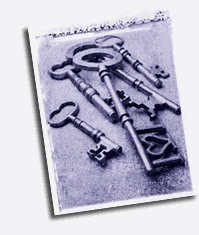
Seven Keys to Closing Success
| Ïðîäàæè | ||||
| Sales.com | ||||
| Closing | ||||
by Graham Denton
Charles B. Roth was one of the Old Masters of the selling profession. He trained thousands of salespeople in companies like Ford and Railway Express, and his most famous book, Secrets of Closing Sales, went into over twenty printings since its appearance in 1940. There's a quaint kind of chumminess to his writing, but the messages that he delivers still have relevance. Here, for example, are his "seven secret closing keys."
 The
"Beyond Any Doubt" Key. This is what today's sales trainers call the
assumptive close. You take it for granted that the customer is going to
say Yes, and your job becomes merely figuring out the how and the when.
Not if, but when. Naturally, this is as much a matter of attitude as it
is of strategy.
The
"Beyond Any Doubt" Key. This is what today's sales trainers call the
assumptive close. You take it for granted that the customer is going to
say Yes, and your job becomes merely figuring out the how and the when.
Not if, but when. Naturally, this is as much a matter of attitude as it
is of strategy.
The "Little Question" Key. In using this key, you ask the prospect a "subordinate question" which, if answered, implies that he's ready to answer the major question about buying from you. Ask the customer whether she prefers the leather or the upholstery seats; whichever answer she gives, she's already implicitly agreed to buy the car.
The "Do Something" Key. Meaning something physical, like filling in a line on an order form or calling your plant to check on delivery schedules. If the customer doesn't stop you from making that move, he or she has given tacit approval to the sale. Tom Hopkins's version of this is the "Let me make a note of that" close. Here's Roth's estimation of its effectiveness: "I do not believe that anything in the history of American retailing has ever made such sales as this simple closing plan."
The "Coming Event" Key. This technique depends on "the vital desire of mankind_to avoid loss." It's the "buy now before the price goes up" pitch that used to be so common in retail marketing. Pretty old hat today, and not one of this expert's most convincing arguments. It only works if I've got an interest in the product to begin with. Otherwise, I'm not going to be impressed by an "act now" discount.
The "Friendly Third Party" Key. Roth's FTP key is a homey version of the testimonial, showcase, or reference close. You engage the prospect's attention by telling a story about how another customer has profited by your solution. Straightforward, uncomplicated, and still effective.
The "Something for Nothing" Key. Like the "Coming Event" key, this one plays on the customer's anticipated sense of loss: If she doesn't buy from you now, she'll miss a sterling opportunity, because on top of the product itself, you're throwing in something extra–but only for a limited time. We've all seen this "inducement" technique on TV infomercials, where frantic announcers shriek "But WAIT! That's not all! IF YOU ACT NOW, you'll also get..." Unquestionably the most irritating of Roth's seven keys.
The "Ask and Get" Key. In other words, ask for the order. Roth puts an interesting spin on this elementary advice by suggesting that when you ask for an order, you're asking for a favor; customers respond because it enhances their sense of self-importance. Although this was much more likely to be true in 1940 than with today's savvy customers, the "ask and you shall receive" key is still good advice. Remember that the Single Biggest Closing Mistake is not to ask for the order.
Charles B. Roth's advice may seem humorously dated, as for example when he describes a top salesman as "a $40,000 a year man," or when his "Ask and Get" examples include the question "Mike, how about half a carload of bacon this morning?" But his basic principles have some staying power. Among "full-time closers" like Tom Hopkins and Zig Ziglar, the "secrets" of Roth and his generation are still very much in evidence.